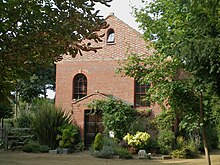Zion Chapel, Newick
| Zion Chapel | |
|---|---|

The chapel from the southeast
|
|
| 50°58′29″N 0°00′33″E / 50.9746°N 0.0091°ECoordinates: 50°58′29″N 0°00′33″E / 50.9746°N 0.0091°E | |
| Location | Western Road, Newick, East Sussex BN8 4LF |
| Country | United Kingdom |
| Denomination | Baptist |
| History | |
| Founded | 14 October 1833 |
| Architecture | |
| Status | Former chapel |
| Functional status | Residential conversion |
| Heritage designation | Grade II |
| Designated | 27 September 1979 |
| Style | Classical |
| Completed | 1834 |
| Closed | 2001 |
Zion Chapel is a former Strict Baptist place of worship in the village of Newick in Lewes District, one of six local government districts in the English county of East Sussex. The tiny building was opened for worship in 1834 in a part of Sussex which was a hotbed of Protestant Nonconformism, and remained as one of three places of worship in the small Wealden village until 2001, when it was sold for conversion to houses. The chapel is protected as a Grade II listed building.
Newick lies north of Lewes next to the River Ouse in the Sussex Weald. Although it is not named in the Domesday survey of 1086, it may have been considered part of a nearby settlement called Allington. It was closely associated with the nearby villages of Barcombe and Hamsey in medieval times. A church existed by 1147, when William de Warenne, 2nd Earl of Surrey granted it to Lewes Priory.
From the 17th century, Protestant Nonconformity became prevalent throughout Sussex, especially in central and eastern parts of the county. Small chapels were regularly built for followers of denominations such as General Baptists, Strict Baptists, Quakers, Presbyterians, Congregationalists and Methodists, often in small villages. One such chapel was founded in 1834 on the main road from Haywards Heath to Uckfield, west of the centre of Newick village. Neither its founder nor its architect are recorded. The founding date is considered to be 14 October 1833, when a rood of land (0.25 acres (0.1 ha)) was granted to "certain dissenters from the Church of England called Calvinistic Baptists" to build a chapel for their use. They had to pay the Lord of the Manor £0.2s.6d for this right. The date of construction was recorded on the entrance porch. The population at that time was 724; by 1851 this had fallen to 483, and a population of 1,000 was only reached by 1931—by which time an Evangelical mission hall, opened in 1892, had become Newick's third place of worship.
...
Wikipedia
